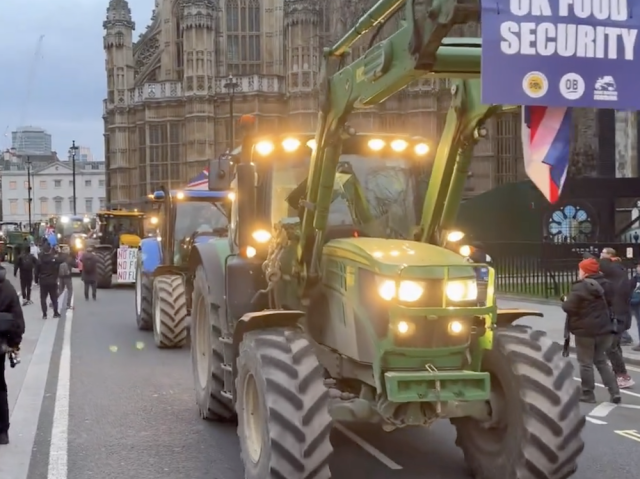Farmers continue EU protests as tractors also hit London
By James EvisonThe sight of tractors on the streets of European capitals has continued this week with protests both in Brussels and in London, following concern about support for agriculture.

On Monday evening, more than 100 tractors passed the Houses of Parliament in London as farmers protested what they claimed was a “lack of support” for food production in the UK.
The organisers of the protest, who are called Save British Farming and Fairness for Farmers in Kent, claimed that cheap imports were putting UK food security at risk, and that the current government needed to put farming “at the heart of British trade”.
The news comes as tractors have again taken to the streets of Brussels to protest during a meeting of the 27 agriculture ministers of the EU states.
Although the protest was smaller than previous ones this year, including one in February which saw farmers and tractors storming police barricades, there was still a large fire created on the Place du Luxembourg outside the Parliament.
But there were also reports of an escalation across Tuesday (27 March), with a number of incidents appearing to be occur around the city.
#Breaking #Farmers #Protests: This morning, several hundred tractors returned to #Brussels in force. The most aggressive demonstration I’ve seen since the 2020 #covid riots. Here, farmers set fire to the exit of Schuman metro station which sits under @EU_Commission & @EUCouncil. pic.twitter.com/AHC5KPRD87
— Marc Tilley (@TilleyMarc) March 26, 2024
Bordeaux
Last month, winegrowers from Bordeaux joined the widespread demonstrations, blocking roads and disrupting traffic on the city’s busy motorway, to protest at rising costs and demanding paperwork.
Partner Content
The demos, which include dumping manure and lighting a bonfire in front of the headquarters for the regional government, the préfecture de la Gironde, were sparked by the French government’s plans to get rid of a tax break on agricultural diesel fuel, with farmers saying that they cannot afford to pay taxes on tractor fuel.
This is similar to in the UK where farming has already been hit by higher prices on fuel. So-called ‘red diesel’, which allowed for an approximately 46p cheaper duty rate, was banned for agricultural use in April 2022.
The president of the Young Farmers of Gironde, Vincent Bougès, who is a winegrower in St.-Sauveur de Médoc, added that certain costs were “no longer sustainable” and that winegrowers want their products “to be valued [and] to sell at the right price.”
National ministers have urged the EU to increase funding for the annual €60bn CAP subsidy scheme, which is around a third of the bloc’s entire budget. There is also concern amongst farmers about new environmental legislation and rules of pesticides, which could cut into their bottom lines, and cheap food imports impacting European farmers.
Strengthened
Plans have been put in place to try and appease some of the protesters by the EU. Ireland’s agriculture minister Charlie McConalogue said the CAP budget must be increased and also “strengthened”, and Belgium’s minister David Clarinval said farmers “need to be paid for what they do” and “that is the core of the problem”.
In all, the CAP is almost €4oom of the EU’s six year budget running from 2021 to 2027 with 80% of cash going to around 20% of farmers.
Rule changes
The European Commission has also proposed measures to ease the administrative burden for accessing the CAP, and also allowing farmers to use set-aside for arable crops rather than as grassland, and even exempting smaller farmers from the fresh environmental rules altogether.
Plans for cutting of pesticide use and emissions reduction goals have also be removed from the outline EU climate plans related to agriculture.
Copa Cogeca, a large farming lobby group, had previously described to the Commission in a letter the environmental rules as a “regulatory tsunami” with “too many rushed consultations” and “top-down targets lacking assessment”.
Related news




